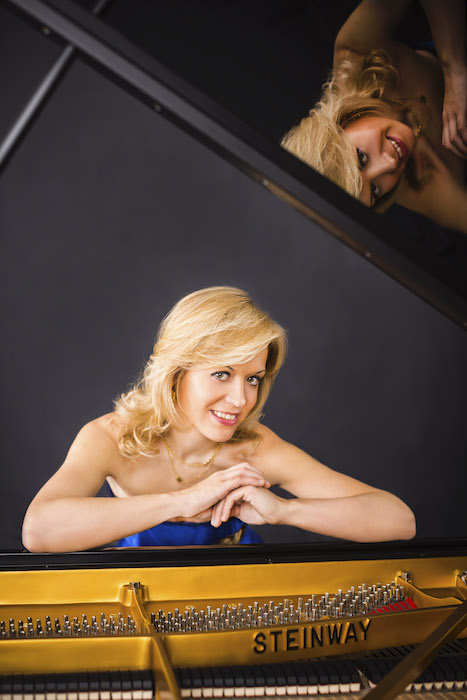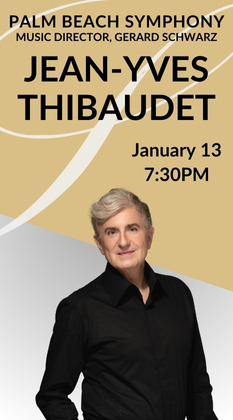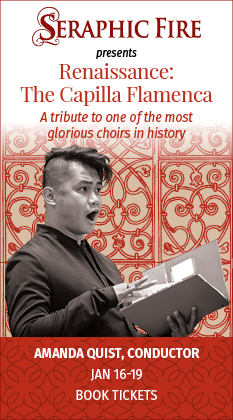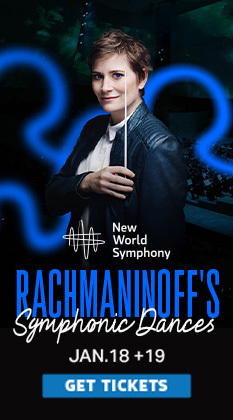Kern’s rich Rachmaninoff a highlight in Ukraine orchestra’s mixed Kravis stand

The National Symphony Orchestra of Ukraine has embarked on a tour of the United States at a fraught period for relations between the two countries.
Ukrainian and American flags flanked the stage Tuesday evening at the Kravis Center in West Palm Beach, as the orchestra performed a concert of Tchaikovsky, Rachmaninoff and the 18th-century Ukrainian composer Maksym Berezovsky.
There was, not surprisingly, no mention of the impeachment hearings in Washington that center on Ukrainian-American relations, as the orchestra and piano soloist gave performances that ranged from respectable to excellent. The ensemble is a good regional orchestra, neither among the worst nor among the best of the many orchestras that have performed on the Kravis Center stage.
The concert opened with the Symphony in C Major, composed around 1773 by Berezovsky, a composer sometimes called the “Ukrainian Mozart.”
There didn’t seem to be anything obviously Ukrainian about Berezovsky’s music. A century later, composers from the Orthodox world such as Rimsky-Korsakov and Mussorgsky would fill their music with pealing bells and choral grandeur, in works that would bear the unmistakable stamp of their culture.
But Berezovsky’s light, tuneful Symphony in C Major sounded like it could have been produced for the entertainment of aristocrats in any 18th-century European palace. Led by artistic director and chief conductor Volodymyr Sirenko, the orchestra gave an energetic performance of music that seemed more reminiscent of Haydn than Mozart in its bright orchestration and cheerful turns of phrase.
In the opening Allegro molto, the musicians played with assurance, accuracy and a well-blended sound, as they expressed the courtly pomp and extroverted sensibility of the music. The Andante kept moving with an underlying energy. And the concluding Presto was particularly transparent, thanks to the skill of the composer and the musicians, allowing a striking bass line to emerge clearly.
Rachmaninoff’s Piano Concerto No. 2 in C minor was the evening’s centerpiece, with soloist Olga Kern, a well-known visitor to South Florida’s concert stages. She gave a committed, grandly conceived performance, sweeping and emotional, delicate and intimate.
She played the unaccompanied opening masterfully, building it in intensity from its soft beginning. As the orchestra joined in, she gave a muscular performance of the complex figures that accompany the orchestra’s melody. In the second theme, she played in a free but never shapeless manner that brought out the music’s sensuality. The orchestra delivered in the big melodies, notably in a passage where the music swells and woodwinds join the piano in the melody, a moment brought off with glowing warmth.
The clarinet tone in the melody that opens the Adagio was rather thin of tone. But Kern’s playing, hushed and intimate in the main theme, created an atmosphere of Romantic ardor, and there was no understating the climax, which she brought off with organ-like chords.
The orchestra gave a fine account of the sultry theme of the last movement, playing in a passionate manner and plush tones. A melody in the cellos got buried, and hearing the cellos turned out to be a problem through the concert, possibly because the section was positioned inside the orchestra, rather than in its usual spot on the outer right.
Responding to the rapturous applause, Kern gave two encores. First came The Music Box by Anatoly Lyadov, played in a dreamy, liquid manner. Then she played something more racy, Rachmaninoff’s transcription of Rimsky-Korsakov’s Flight of the Bumblebee, delivering a fluid and frenetic rush of sound.
The concert ended with Tchaikovsky’s Symphony No. 1, known as “Winter Daydreams.” Strings produced a glossy sound, accurate and transparent, as winds played the opening theme. There was busy, nervous energy in the interior passages, and a pensive, somber tones in passages of brass and lower strings. But brass were sometimes too loud, burying the essential frantic edge of the violins that topped climactic passages.
In the Adagio, cellos again sounded subdued in a big melody that should have shined from the orchestra. Horns produced a pallid tone in their own big melodic moment. The soaring melody of the Scherzo, which suddenly ascends through the strings in one of those climactic Tchaikovsky passages, felt underpowered and underexpressed.
The finale was full of tension and a sense of anticipation. Brass played with resonance and throaty force. Under Sirenko’s direction, the orchestra gave a well-paced performance, with suspense and understated power. The final moments came off as an exultant anthem that brought the work to a satisfying close.
Posted in Performances
Leave a Comment
Wed Nov 20, 2019
at 8:14 am
No Comments




